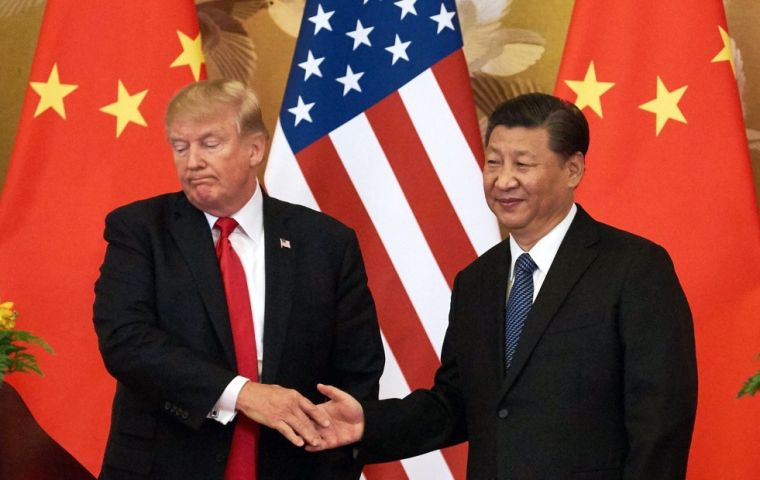MercoPress. South Atlantic News Agency
China/US technical trade talks end with “understanding of each others' concern”
 The three-day talks in Beijing were the first face-to-face talks since presidents Donald Trump and Xi Jinping met in Buenos Aires in December
The three-day talks in Beijing were the first face-to-face talks since presidents Donald Trump and Xi Jinping met in Buenos Aires in December Trade talks between China and the United States this week were extensive, and helped establish a foundation for the resolution of each others' concerns, China's commerce ministry said on Thursday, but gave no details on the issues at stake.
The three-day talks in Beijing that wrapped up on Wednesday were the first face-to-face negotiations since U.S. President Donald Trump and his Chinese counterpart Xi Jinping met in Buenos Aires in December and agreed on a 90-day truce in a trade war that has disrupted the flow of hundreds of billions of dollars of goods.
The two sides “held extensive, deep and thorough exchanges on trade and structural issues of common concern, which promoted mutual understanding and established a foundation for the resolution of each others' concerns”, the Chinese commerce ministry said in a brief statement.
Companies in both countries are feeling the pain from the effects of the trade dispute. Apple Inc rattled global markets last week when it cut its sales outlook, blaming weak demand in China, while Chinese exporters reported a thinning pipeline of orders from the United States.
Washington has presented Beijing with a long list of demands that would rewrite the terms of trade between the world's two largest economies. They include changes to China's policies on intellectual property protection, technology transfers, industrial subsidies and other non-tariff barriers to trade.
Nearly halfway into the 90-day truce, there have been few concrete details on progress made so far. The meetings in Beijing were not at a ministerial level, so were not expected to produce a deal to end the trade war.
On Wednesday, the U.S. Trade Representative's offices said in a statement officials from the two sides discussed “ways to achieve fairness, reciprocity and balance in trade relations”.
“The talks also focused on China's pledge to purchase a substantial amount of agricultural, energy, manufactured, and other products and services from the United States,” the USTR said.
At stake are scheduled U.S. tariff increase on US$200 billion in Chinese imports. Trump has said he would increase those duties to 25% from 10% currently if no deal is reached by March 2, and has threatened to tax all imports from China if Beijing fails to cede to U.S. demands.
U.S. officials have long complained that China has failed to live up to trade promises, often citing Beijing's pledges to resume imports of American beef that took more than a decade to implement.
No schedule for further face-to-face negotiations was released after the talks, and USTR said the American delegation was returning to Washington to report on the meetings and “to receive guidance on the next steps”.
Both sides agreed to continue to maintain close contact, the Chinese commerce ministry said.
Since the Trump-Xi meeting in Argentina, Beijing resumed purchases of U.S. soybeans. Buying had slumped after China imposed a 25 percent import duty on U.S. shipments of oilseed on July 6 in response to U.S. tariffs.
China has also cut tariffs on imports of cars from the United States, dialed back on an industrial development plan known as “Made in China 2025,” and told its state refiners to buy more U.S. oil.
Earlier this week, China approved five genetically modified (GM) crops for import, the first in about 18 months in a move that could boost its overseas grains purchases and ease pressure from the United States to open its markets to more farm goods.
One of the biggest challenges to any deal would be to ensure that China enforces whatever is agreed to stop technology transfers, intellectual property theft and hacking of U.S. computer networks.
The U.S. Trade Representative's office said officials broached those topics and discussed the need for any agreement to include “complete implementation subject to ongoing verification and effective enforcement.”




Top Comments
Disclaimer & comment rulesCommenting for this story is now closed.
If you have a Facebook account, become a fan and comment on our Facebook Page!